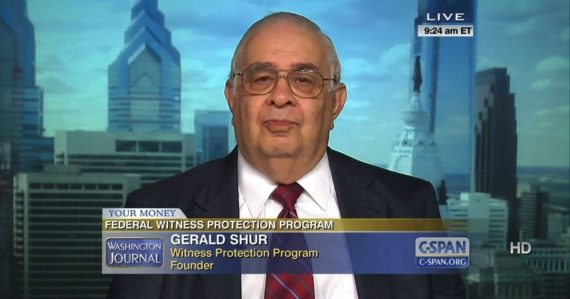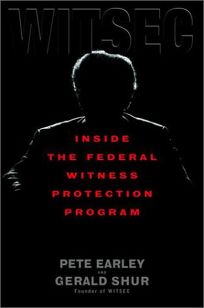
Got Mafia hitman a job as delivery truck driver – penile implant for depressed gangster – in return for breaking Omerta code of silence bringing down the mob.
(8-29-20) My good friend and co-author, Gerald Shur, the founder of the federal Witness Protection Program, has died. He passed away August 25, at age 86, of lung cancer, his son, Ron, told me in an email.
Gerald and I wrote WITSEC: Inside the Federal Witness Protection Program, a 2002 nonfiction history of the program and a biography of his life up to his retirement from the Justice Department.
Although relatively unknown to the public, Shur played a pivotal role in the government’s war against organized crime. He was involved in every major Mafia witness case starting in 1961 until he retired in 1995.
Beginning with Joseph Valachi, considered the first member of the La Cosa Nostra to expose the mob’s secrets, Shur interacted with a Who’s Who of organized crime, including Joseph ‘the Animal’ Barboza, Vincent “Fat Vinnie” Teresa, Aladena “Jimmy the Weasel” Frantianno, Joseph “Joe Dogs” Iannuzzi, and Henry Hill of the best-selling book Wiseguy and popular movie, Goodfellas. One of the last mafia informats Shur handled was Sammy “the Bull” Gravano, who was initially given a new identity and relocated after he’d admitted 19 mob killings in return for his successful testimony against John Gotti, a flamboyant New York Godfather who had been known as the “Teflon Don.”
In a strange twist, Shur and his wife, Miriam, were forced to enter WITSEC themselves for several months in 1991 after the DEA intercepted a Medellin drug cartel hit man entering the U.S. who had their names on his hit list.
Powerful Impact Against The Mob
Shur’s witness protection program is considered one of three tools that broke the back of organized crime during its peak in the 1970s. The other two were federal wiretaps and the Racketeer-Influenced and Corrupt Organization Act, known as RICO. During his 34-year tenure at the Justice Department, 6,416 witnesses and 14,468 of their dependents, including wives, children and mistresses, were given new identities and relocated.
No witnesses got protection without his personal attention. He wrote nearly all of the program’s rules, shaped it based on his own personal philosophical views, and guided it with an iron hand. He helped create false backgrounds, arranged secret weddings, oversaw funerals. He personally persuaded corporate executives to hire a mafia hit man as a delivery route driver, once arranged for the wife of a Los Angeles killer to have breast enlargement surgery to keep her husband happy, and got the government to pay for a penile implant for one mobster turned witness after he became depressed.
In return, WITSEC witnesses helped topple the heads of every major crime family in every major city, helping send ten thousand criminals to prison because of their testimonies.
Most Relocated Witnesses Did Well And Disappeared. Some Did Neither
Arranging new identities by establishing false backgrounds initially was simple for Shur who called on his friends for help. A Maryland school administrator agreed to duplicate school records for mobster’s children under their assumed names. Shur further used his contacts to create birth certificates and obtain driver’s licenses. The development of shared computerized public records made hiding witnesses much more difficult. It was an irony not lost on Shur who found his biggest obstacle to hiding someone was his own government’s prying eyes.
The type of criminal the program needed to protect also changed. Shur recalled that mobsters sent to prison by witnesses generally didn’t seek revenge after they did their time and didn’t threatened witnesses’ extended families. After WITSEC helped decimate the mob, Colombian and Mexican drug cartels filled the void with the emergence of cocaine and were more vengeful. In his final days running the program, Shur had to relocated witnesses in high profile terrorist cases.
Shur also dealt with witnesses who changed their minds about disappearing. One mobster ran for mayor of the town he was sent too. Many others had difficulty severing all ties with their families, a requirement that left them lonely with fabricated paths. Most had to take low level jobs to stay out-of-sight. Disappearing proved more difficult than the fantasy that many imagined. But most used their second chances to reinvent themselves as law abiding citizens.
Not everyone supported creation of WITSEC. Several in law enforcement objected to rewarding known killers and other criminals with new identities and relocating them in unsuspecting neighborhoods, especially when those witnesses continued to break the law.
The worst such breach involved a small time thug named Marion Albert Pruett, who’d testified in a murder trial against Allen “Big Al” Benton in 1978. Secretly relocated in New Mexico, Pruett murdered his wife, Michelle, before going on a multi-state crime spree, during which he robbed six banks and two convenience stories, killing six. “I’ve become a mad dog killer,” he told authorities, “because I’ve done so much cocaine.”
Members of Congress held a special investigative hearing after Pruett was captured. Shur testified that Pruett had been cut loose from the program eight months before his rampage. (Typically, witnesses were provided new IDs and relocated, but stopped receiving protection and federal subsidies after a specified adjustment period.)
Shur testified that a study had found only 21 percent of protected witnesses at that time had been arrested within two years after they were relocated, that meant 79 percent had stayed out of trouble – a better average than normal recidivism rates. (In another highly publicized case, Sammy the Bull left the program in 1995, only to be arrested five years later on federal and state drug charges.)
Shur Tangled With Geraldo Rivera
Geraldo Rivera, then a reporter for ABC, used the Pruett case to paint a picture of WITSEC as being out of control in a 1983 20/20 News broadcast entitled “A Deal With The Devil.” Shur insisted that no mobster who had followed his guidelines was located by the mob and murdered in retaliation for their testimony. Rivera cited a handful of incidents when former witnesses no longer in the program were killed most after they violated rules designed to protect them, such as not contacting parents and relatives.
Shur and Howard Safir, who was in charge of the U.S. Marshals Service (which relocated and protected witnesses) feared that Rivera might edit their comments out-of-context to sensational the Pruett story and harm WITSEC so they insisted that he interview them live. Rivera refused and, instead of talking to Shur, spliced footage from testimony that he’d given in an earlier congressional hearing unrelated to Pruett into his televised reports.
“Rivera made Howard Safir look like a liar, and…he made me look callous about the people Pruett had murdered,” Shur told me. “To me, Rivera was the best example of the worst kind of journalist.” When I contacted Rivera, he called Shur a “crybaby.” Meanwhile, Safir sued Rivera and ABC for slander seeking $10 million in damages. The network paid Safir an undisclosed sum in an out-of-court settlement.
That hearing and others by members of Congress concluded WITSEC was a vital crime fighting tool and approved of Shur’s handling of it. He was given a lifetime achievement award by Attorney General Janet Reno upon his retirement, one of the Justice Department’s highest honors.
Many Witnesses Did Time Before Getting New Names
One misconception the public had was that criminals who snitched didn’t have to serve time in prison. Shur worked with then-federal Bureau of Prisons Director Norman Carlson to arrange for so-called secret cells in prisons where witnesses could be housed away from other prisoners. Shur and Carlson also created a furlough program where selected convicts (mostly drug dealers) were given passes to leave their cells to return to the streets to help undercover agents make buys. The movie 48 Hours played off that little known trick. It was one of dozens of movies about WITSEC, the most popular being My Blue Heaven, starring Steve Martin, that fed the public’s fascination about the program.
Shur’s Idea Was Born Of Necessity
Shur was fresh out of law school and a small time Texas attorney in 1961 when he read in the Dallas Morning News of Attorney General Robert Kennedy’s plans to significantly enhance the Department’s efforts against organized crime. He was one of a new batch of attorneys hired to reinvigorate the Department’s Organized Crime and Racketeering Section. When he was sent to personally handle Joe Valachi, Shur realized how important flipping a mobster could be. The problem was what to do with a witness after they were no longer useful. Valachi asked to be sent to a desert island. He ended up dying in a prison cell – hardly an inducement to become a witness. At the same time, legendary U.S. Marshal John Partington safely kept Joseph Barboza alive after he cut a deal to testify – showing protecting mobster snitches was possible.. The Valachi and Barboza cases gave Shur the idea to create WITSEC.
Shur had come face-to-face with his first gangster at age fifteen when a bodyguard for labor racketeer John “Johnny Dio” Dioguardi greeted Shur’s father, Abraham, one day. Abraham ran a dress sewing business in the mob-infested garment district. It was Shur’s New Yorker toughness years later mixed with pragmatism and compassion that made him the perfect choice to handle relocating mobsters.
Dedicated Family Man Who Married His Childhood Sweetheart
Shur left Manhattan to study law at the University of Texas where he met Miriam Heifetz, a marketing student. He asked her to marry him on their second date. She declined but a month later agreed. They were seventeen and neither had a job. Texas law required women to be eighteen and men to be twenty but they found a clerk who didn’t question their ages and were married. They kept their marriage secret and lived apart on campus until four months later when their parents agreed to let them marry in July 1952.
“The rabbi spoke for several minutes about how wonderful Miriam was covering all of the high points in her life. When it came time to talk about my life, he simply said, ‘And here is Gerald. Isn’t he lucky to have found Miriam? I didn’t care because I was truly lucky.”
Anyone who knew them instantly recognized how devoted Miriam and Gerald were to one another. They were married 68 years and she was with him when he died.
Shur told me that his father was one of his biggest influences in his life. Abraham had grown up poor but eventually owned a dress-making business and moved into an upscale Manhattan neighborhood.
“You can do the same,” his father told him.
“My father told me how important it was for a person to always remember his roots and to always, always, give something back to the community. “You owe a debt to society for what you have been given. You must give something back.”
The younger Shur promised he would.
Gerald Shur was also one of the most decent men I have known and was the epitome of a good public servant – humble, self-sacrificing, dedicated, hard-working and honest.
He kept his promise to his dad.
Read more at WITSEC: Inside the Federal Witness Protection Program




